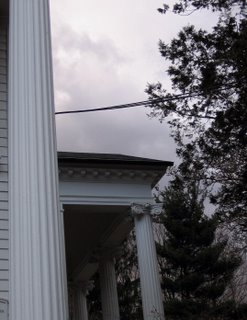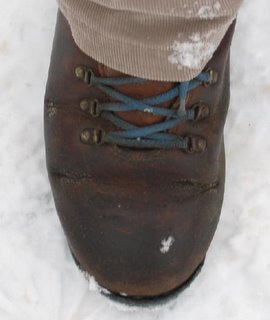Tine Relives the Great Fire of 1864

Tine had turned back for home at the Congregational Church ("Congo," as it was once known at the school across the street) after a raindrop had landed on her nose.
Before the gray skies and rain had arrived, she'd been intrigued by a new sight on the church lawn, an inviting little hut with its front door wide open.

"I think perhaps they've reached some sort of friendly accommodation with Will Warren," Tine said to Rubob. "That might explain the hut."
Will Warren was a sheep rustler and Sabbath-breaker who'd been run out of town around 1800. He fled to a cave on Rattlesnake Mountain, where he was looked after by Tunxis Indians. (Tine's Nestor Episode, at Will Warren's Den.)
"I don't think he'd have been so inclined to break the Sabbath if he'd had his own little hut," Tine said to Rubob.
Rubob was directing his thoughts to loftier matters, as he's in the habit of doing on walks: He was glancing at the sky, which was starting to cloud over.
"I think I might have felt a drop of rain, Tine," he said.
Tine was recalling another outdoorsman who'd had problems with his church, Henry David Thoreau. He'd refused to pay his church taxes. If he'd known they were going to good use, Tine reckoned, he might have reconsidered. He might even have attended services after seeing the hut, she thought.

"Some prefer to worship in private," Tine reflected, "and he was quite fond of huts, after all. He'd built a similar one for himself at Walden Pond."

Thoreu's hut at Walden Pond. Photo from:
http://www.4peaks.com/fthwalden.htm
"Thoreau ran off to the woods like Will Warren," Tine said to Rubob. "I think the hut might attract these solitary lovers of the wilderness back to the church. It's a very sensible idea. It's probably an outreach effort by the church elders."
"I really do think it's starting to rain, Tine," he said.
That's when the raindrop dropped on Tine's nose, and Tine, looking up into the darkening sky, flew off in the direction of home, just as quick as that. She doesn't usually flinch at raindrops, but she'd been invited to her one dinner party of the year that evening, and she didn't want to arrive wet and windblown.
"But come to think," Tine thought to herself, "I once had a friend whose son told her she always looked her very best when she'd just gotten off her bicycle and was wet and windblown. 'That's when you look most like yourself,' the boy told his mother."
Tine slowed down, thinking she might allow herself to get soaked after all.
"In any case, I'd miss the sunset if I dashed home,"she thought.
Rubob caught up to her and said, "Look, Tine, it's just as it was a few days ago. What a spectacular sight."
For a moment, Tine thought, the village looked as it might have appeared during the great fire of 1864.

The fire had begun in a barn, and a nine-year-old boy had spotted it from the Meadows, where he was loading hay. Adrian Wadsworth's account of that day was published in a newsletter by the Historical Society last year. He wrote:
Adrian was left behind in the fields while his father went off to fight the fire. He wrote about what he found when he returned to the village later in the afternoon:"The cart was driven to the last haystack, and as I stood up to catch the bundles I looked up town and saw a mighty column of smoke ascending to a great height into the air. I said, 'Look up town, Father! My conscience, that's a hay barn.' "
"Looking up Main Street, we saw all the houses and buildings had disappeared. Only the standing ruins of the stone store remained above ground from Mill Lane to the open lot in front of our house. Driving into our yard, we saw that all our farm buildings and upper house had disappeared as well. ""It's a good job a rainstorm is on the way," Tine said to Rubob.
"We saw squads of men in the house lots fighting grass fires on all sides; the back orchard was burned over as well as the old cemetery. ... Across the street on the east side we noticed the fronts of every dwelling house draped with carpets to protect them from the heat of the flames. The carpets were drenched with well water which was carried to the apex and poured over their surfaces. This undoubtedly saved them from destruction as the heat was very intense. On the open lot on the west side of Main Street were stacked, in separate piles, all the household goods and furnishings, of every description, rescued by hundreds of willing hands."
"With the burning of the Cowles house the wind had risen to the force of a great gale carrying, witnesses say, flaming shingles through the air with the greatest of force. Falling on the buildings, they threatened all the structures eastward to the mountain. Some of these firebrands fell on the great hay barn of W. M. Wadsowrth and ignited the greatest spectable of the afternoon: the destruction of all the buildings, sheds and tenement house on his premises."
-- From an account of the great fire of 1864, made available to the Farmington Historical Society by Lois Wadsworth.
"Why's that, Tine?" Rubob asked.
"The fire Rubob, the great Main Street fire of 1864," she said. "You were just looking at it through the trees."
As they walked down their street toward home, the rain clouds vanished as quickly as they'd arrived, blowing off to the north.
As Tine walked up her driveway, the sunset illuminated the hillside behind Tine's house with a refulgent, burning light that seemed to come from within the woods.

"The light of the wilderness," Tine thought -- "just the sort of thing Thoreau would like."
And Thoreau had written in his essay "Walking": "I saw the setting sun lighting up the opposite side of a stately pine wood. Its golden rays straggled into the aisles of the wood as into some noble hall."
Standing by the door of her house, looking back into the woods, Tine considered, "Yesterday's walk was all about Tithonus' love affair with the dawn. Today it seems we've moved on to the sunset. Tithonus himself would have been happy to see the sunset." (Tine's Nestor Episode.)
Tithonus , the son of the king of Troy, had eloped with the goddess of the dawn, Aurora, and he'd lived to regret it. He'd lived a very long time, as it happened, because Aurora had asked Zeus to make him immortal. She'd forgotten, however, to ask Zeus to make Tithonus eternally young, and he and Aurora had begun to get on each others' nerves. Tithonus had gotten older and older, uglier and uglier, and more and more disagreeable and decrepit.
"Maybe if Tithonus had looked over his shoulder at the sunset, he might have had a chance to get what he wanted in the end -- a final trip to the fiery underworld, like Orpheus," Tine said to Rubob. But Rubob had no idea what she was talking about (and very sensibly so).
Orpheus; photo from:
http://www.dailyinfo.co.uk/reviews/theatre/Orpheus.htm
"I'm all in a muddle," Tine said to Rubob as she stepped into the house and took off her walking shoes.
"Everyone's mixed up with everyone else, and time is out of joint," she thought. "That's often how it is in this village. It doesn't seem to have its foot in any one century. Events and ideas are scattered around like leaves -- or like all the things stacked in the open lot during the fire."
She swept the windblown hair off her face. "I'm going to look a sight for the party," she thought.
Rubob removed his boots and put them beside Tine's shoes. The sight of them made Tine think how Rubob's feet are always planted firmly in the day, neither chasing the dawn nor fleeing into the sunset.
"I get lost in all my musings," she reflected, "and he guides me home, through rain, fire and windstorms."
"And as she made herself a pot of tea, she thought to herself, "All in all, it was a very pleasant walk."





